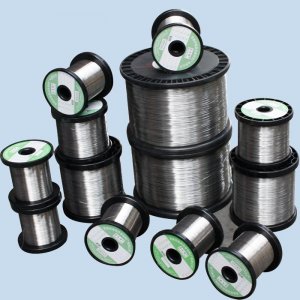BP5 tungsten rhenium thermocouple wire

International Equivalent
| Mark | Analogue | W. Nr. | Aisi Uns | En | Order |
|---|---|---|---|---|---|
| VR5 | WRe20 | Delivery from the stock, in stock | |||
| BP20 | WRe20 | Delivery from the stock, in stock |
The well-known aphorism "everything is learned by comparison" clearly illustrates the qualities of such alloys as BP5 and BP20.
Heat resistance of BP5 and BP20
It is the tungsten and rhenium that define the alloys' strengths. Tungsten is one of the most refractory, heavy and hard metals, melting at t° 3410 °C and boiling at the same temperature as the surface of the Sun: 6690 °C. Tungsten alloys lead all others in hardness and refractoriness. Tungsten is slightly inferior to rhenium, with a melting point of 3170 °C and boiling point of 5870 °C. Rhenium leaves the other metals far behind in heat resistance, demonstrating high strength and resistance to corrosion.
Alloying features
Alloying tungsten with 5% of rhenium improves ductility and increases the recrystallization temperature of the alloy - this is especially important when using it for the positive electrode of the thermocouple. Using the alloy as the negative electrode of a thermocouple to achieve maximum thermoelectromotive force requires a rhenium content of up to 35%, but no higher. Otherwise, at 1100 °C the alloy homogeneity is lost and the thermo-electromotive force is markedly distorted. In domestic metallurgy rhenium additive does not exceed 20%, which allows the use of tungsten-rhenium thermocouples at t° up to 2500 °C.
Resistance
Tungsten-rhenium alloy shows resistance to helium, argon, dry nitrogen and hydrogen. Alloying with silica-alkali additives can increase the stability of the alloy at temperatures up to 2000 °C by 2-3 times. BP5/20 sensors are capable of working in vacuum conditions. For more effective work in vacuum at 1800 °C and above electrodes with larger diameter should be used. BP5/20 are widely used as a differential thermocouple - can consist of two equal thermocouples, connected, as a rule, opposite each other. Such thermocouples are capable of measuring the temperature difference between two different junctions: working and conditional.
Thermo EMF
The nominal thermo-EMF at a temperature drop to 1600 ° C is also reduced to 24.59 mV at t = 1500 ° C is not more than 23.31 mV, and at t = 1400 ° C nominal thermo-EMF is 21.97 mV.
Disadvantages of BP5 and BP20
The disadvantages of these alloys include poor reproducibility of thermo-electric emf, due to which it is necessary to group thermocouples by categories: A-1, A-2, A-3. Category A-1 allows the use of the alloy at a maximum temperature of 2200 ° C, temperature use of A-2 and A-3 is limited to 1800 ° C. It is strictly prohibited to use wire from different batches, as each batch of wire has a "different" thermal EMF. Tungsten and rhenium are rare metals, so their cost is very high. The price of BP5/20 is much higher than the cost of thermocouples made of other materials, but still less than the cost of optical pyrometers for measuring and controlling temperature conditions in similar industrial conditions.
During the interaction of nitrogen and tungsten-rhenium alloy under vacuum conditions, it is necessary to maintain cleanliness and especially careful attention to the mandatory removal of organic substances and dust.
Application
BP5 and BP20 are used for the production of measuring and transducer devices, contact thermocouple sensors (TVR) for measurement of the highest temperatures in metallurgy - liquid metals. Up to 2500 °C. The measurement error is extremely low (±0.01 °C), which makes TVRs one of the most accurate instruments for measurements in such an aggressive environment.
Graduation table -thermocouple VAR-5 (VR-5)/VR-20 at t° of free ends 0 °C Table Nominal static conversion characteristic VR (A)-1.
| Working end temperature t ° C | T.e.d.mV, for temperature, °С | T.a.d.mV, for temperature, °С | T.E.D.mV, for temperature, °С | T.a.d.mV, for temperature, °С | T.a.d.mV, for temperature, °С | T.a.d.mV, for temperature, °С | T.a.d.mV, for temperature, °С | T.E.D.mV, for temperature, °С |
|---|---|---|---|---|---|---|---|---|
| 0 | 10 | 20 | 30 | 40 | 50 | 60 | 70 | |
| 0 | 0 | 0,121 | 0,246 | 0,373 | 0,504 | 0,637 | 0,772 | 0,910 |
| 100 | 1,337 | 1,483 | 1.632 | 1,781 | 1,933 | 2,086 | 2,240 | 2,396 |
| 200 | 2,871 | 3,032 | 3,193 | 3,355 | 3,518 | 3,682 | 3,847 | 4,012 |
| 300 | 4,512 | 4,680 | 4,843 | 5,016 | 5,185 | 5,354 | 5,523 | 5,693 |
| 400 | 6,203 | 6,373 | 6,543 | 6,714 | 6,834 | 7,065 | 7,225 | 7,396 |
| 500 | 7,908 | 8,073 | 8,248 | 8,418 | 8,588 | 8,758 | 8,928 | 9,098 |
| 600 | 9,605 | 9,774 | 9,943 | 10,111 | 10,280 | 10,448 | 10,615 | 10.783 |
| 700 | 11,283 | 11,450 | 11,616 | 11,782 | 11,947 | 12,112 | 12,277 | 12,442 |
| 800 | 12,933 | 13,096 | 13,259 | 13,422 | 13,584 | 13.746 | 13,907 | 14,068 |
| 900 | 14,549 | 14,708 | 14,867 | 15,026 | 15,184 | 15,342 | 15,500 | |
| 1000 | 16,125 | 16,281 | 16,436 | 16,590 | 16,744 | 16,898 | 17,051 | |
| 1100 | 17,659 | 17,810 | 17,960 | 18,110 | 18,260 | 18,409 | 18,557 | |
| 1200 | 19,146 | 19,292 | 19,438 | 19,583 | 19,728 | 19,872 | 20,015 | |
| 1300 | 20,584 | 20,725 | 20,866 | 21,006 | 21,145 | 21,284 | 21,423 | |
| 1400 | 21,971 | 22,107 | 22,242 | 22,377 | 22,511 | 22,645 | 22,778 | |
| 1500 | 23,306 | 23,436 | 23,566 | 23,696 | 23,825 | 23,953 | 24,081 | |
| 1600 | 24,588 | 24,713 | 24,838 | 24,962 | 25,085 | 25,209 | 25,331 | |
| 1700 | 25,816 | 25,936 | 26,056 | 26,175 | 26,293 | 26,411 | 26,528 | |
| 1800 | 26,992 |
Basic technical data
| Temperature ° C | Rated Rated power factor, mV | Variation of teds from nominal, mV |
|---|---|---|
| 1600 | 24,59 | ±102 |
| 1500 | 23,31 | ±99 |
| 1400 | 21,97 | ±96 |
General data
Tungsten-rhee wire for thermocouple thermocouple electrodes annealed graded with nominal static conversion properties VR (A)-1 Wire meets specifications Yaeo.021.142 TU for production of thermocouples VAR-5 (VR-5)/VR-20
Recommendations for application
It is unacceptable to use thermocouples made of thermocouple wire from different series, even with the same nominal static characteristic of thermoelectrons.
Buy at the best price
Evek GmbH stocks a wide range of thermocouples. Our representative offices are located. You can make a purchase without leaving the office, through the Company's website. To purchase you only need to place your order and click the "buy" button. If necessary our managers can consult you on any current questions. They will give all necessary information concerning products, price range, and terms of realization. Lead time is minimal. In case of bulk purchases we provide discounts.
 Experience of using tungsten thermocouples BP5/20 in high-temperature thermometry
Experience of using tungsten thermocouples BP5/20 in high-temperature thermometry 